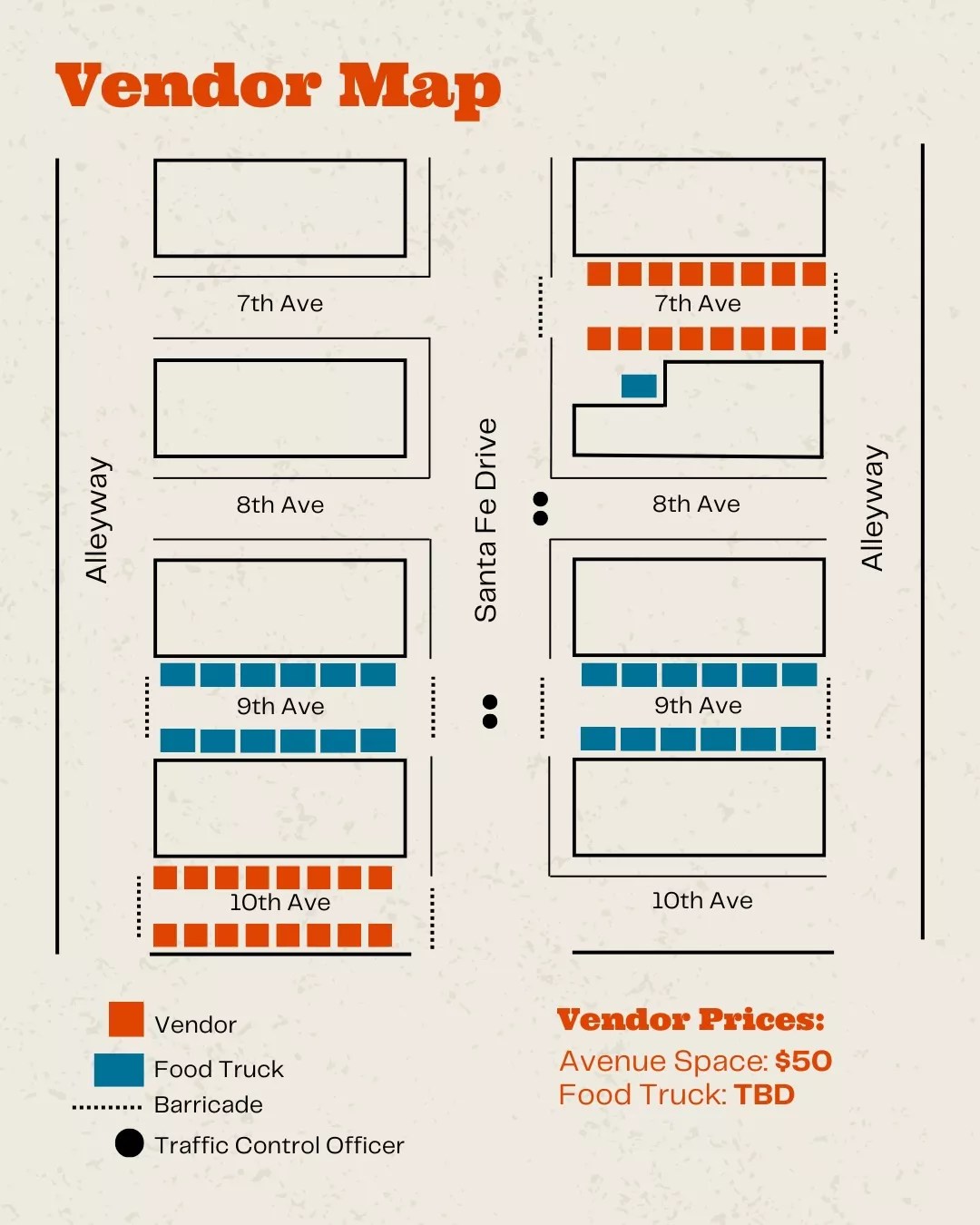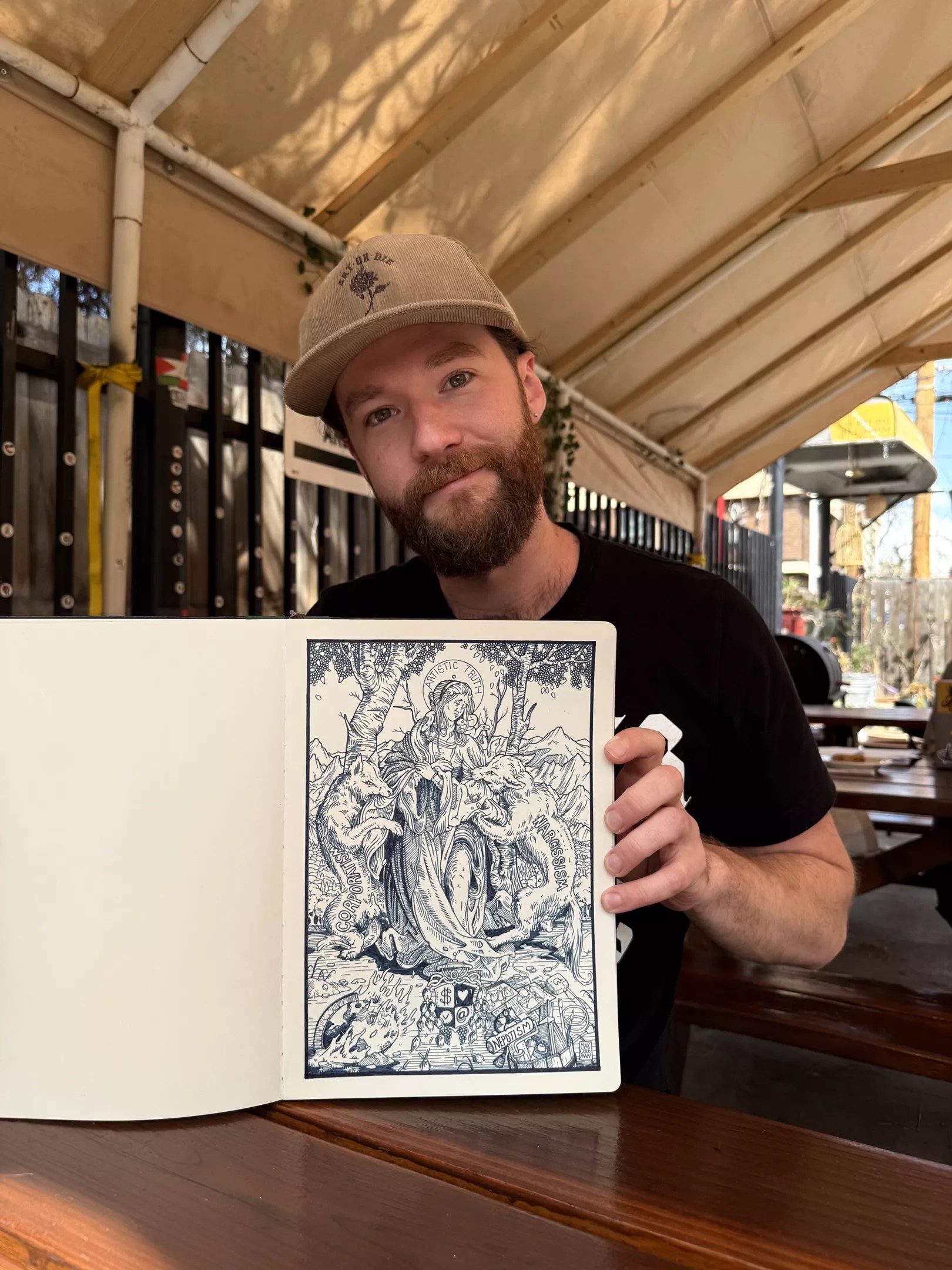
Michael Emery Hecker

Audio By Carbonatix
When he moved to Denver almost a decade ago, Max Coleman remembers driving and walking past First Friday in the Art District on Santa Fe and seeing people selling art on the streets. “And it wasn’t just art,” he recalls. “People would be writing poems on a typewriter and making caricatures. There were buskers and guitar players, there were sword swallowers and fire throwers, there were people selling gems.”
Coleman, an artist who uses the name “Oak Bloak,” finally got the courage to set up his own table about three years ago: in front of Abstract Denver with the permission of the business owners. “It was the most magical, freeing experience to just meet people on the street where they’re at in their lives,” Coleman says. “It was extremely liberating and exciting for me.”
The friends he’s made through First Friday and the experiences he’s had there have shaped him as an artist and allowed him to pursue art as a full-time profession, Coleman says. He never knew who would be next to him, whether an out-of-state van selling fossils or a young musician or a glassblower who took the bus from two counties over to get to the event. “It’s the best day of the month,” Coleman says. One of the reasons it felt so good was because First Friday started as a free-form, grassroots event, without specific rules and requirements.
But last year, officials wearing vests started approaching the vendors along Santa Fe Drive. “They made claims that me selling my art on the sidewalk was a safety issue, that it wasn’t condoned,” Coleman says. “They mentioned this to other artists. We asked if we were going to be cited with a ticket. We were not cited with a ticket, and we were left confused.”
Adding to the confusion is the ADSF’s new rule that requires vendors to register and pay for a spot. “The nebulousness of it is slightly distressing, because I’m wondering if there’s a possibility that I’m going to be removed from selling my art on First Friday,” Coleman says.
First Friday Permits and Registrations
In an April 1 Instagram post that was not an April Fools’ prank, ADSF announced the changes to this year’s First Friday rules: “Within the past few years, we’ve experienced challenging situations related to foot and vehicle traffic, inaccessible sidewalks, illegal vending practices, and more,” it says. “To stand by our motto of ‘Art for All’ and to foster a safe space for our patrons, the ADSF will be implementing a new vending system with designated vendor spots, closed avenues, and traffic control support.”
That system requires vendors to register in advance and “pay a small fee” before they’re assigned to a designated spot off Santa Fe. “7th, 9th and 10th Avenues will be closed to traffic for vendors and food trucks,” the post continues. “Santa Fe Drive will remain open to traffic. Vendors will not be allowed to set up on sidewalks along Santa Fe Drive. Sidewalk permits will be in effect to keep them clear and accessible.”
“That’s way away from the cultural centers,” Coleman says of the spots. “There’s a whole microcosm of people who know each other, cherish each other’s company and look forward to this all month.”
A link to register notes that vending spots are $50 each, and despite the restricted locations, they filled up fast: By April 25, all of the spots for the rest of the year were taken. A registration form for food vendors notes that food trucks, concession trailers or tents must pay $200 per event.

A vendor map shared by the Art District on Santa Fe.
ADSF
According to Nancy Kuhn, spokesperson with the Denver Department of Transportation & Infrastructure, a few years ago, local businesses started complaining about vendors setting up on the sidewalk and other public rights of way. “We went out and educated these vendors, letting them know they need a permit to set up on the sidewalk and must do so in a way that allows for clear pedestrian passage around them,” Kuhn says.
The ADSF decided to get more organized, too, and applied for a Special Events permit through Denver’s Office of Special Events for the May, June, July and September art walks this year, Kuhn notes. Now that First Friday is a permitted event, the district is requiring that vendors register to sell their wares and has “the ability to have non-registered vendors removed,” she adds.
August’s First Friday is usually closed to traffic altogether, which involves more permitting. “We anticipate the permit holder in this case to be the Santa Fe Business Improvement District,” Kuhn says. “We are awaiting their permit request materials and can provide more info to the public about that event when we get those materials and the chance to review them.”
(Neither the ADSF nor the Santa Fe BID responded to Westword‘s numerous requests for comments before this article was published.)
“The Business Improvement District sounds like a glorified HOA,” Coleman says. “I feel like a homeowner’s association produces a homogenous solution for an area that people live in, and the homogenous solution for an arts district is a death knell. It goes against the entire mindset.”
“I don’t know what the BID actually does,” says Dave Roggeman, owner of Abstract Denver. While he notes that he doesn’t speak for all the businesses along Santa Fe, he’s worried that with the changes to First Friday, “it seems like they’re trying to kill the soul of what the art district has become.”
Roggeman adds that he understands the need to keep people safe, “but shucking people to a side street – and not everybody’s going to get in since it’s juried – it seems like a cash grab to me.”
A cash grab that cuts out the independent artists, even though they bring people to an area that’s often empty. “Businesses seemed to be directly benefiting from the vendors,” Coleman says. “It seemed like the avenue really was a living, breathing organism on First Friday.”
“I was going back and looking at my sales numbers, and I really think this DIY vendor pop-up has gotten bigger and bigger over the last two years, and they have been our best two years on First Friday,” Roggeman confirms. “I think the way it’s set up right now is not hurting my business, it’s helping my business.”
After this article was first published, ADSF director of programs and operations Ana Paula Pinto responded to Westword. “Organizing vendors in this way allows us to still have them be a part of our events, while keeping sidewalk space accessible and ADA compliant for large summer crowds,” she says. “This was not the case when vendors were freely setting up along Santa Fe Drive, and raised flags with adjoining businesses (there were vendors getting into altercations with local business owners) and the City (pedestrians were spilling onto the street to make their way around vendors, wheelchairs could not get through, etc). While we would love to instead implement full closures of Santa Fe Drive, these are not possible with our current budget, and the city is reluctant to permit them more than once per year.”
She adds that when ADSF pulled sidewalk permits for First Friday, “we wanted to include more spaces on Santa Fe for vendors but the city will not permit this. All vending on Santa Fe is basically illegal because the sidewalks are not large enough to maintain accessibility for pedestrians while allowing vendors to set up.”
As for the vendor fees, they were introduced “to help us make these free events sustainable,” she adds. “ADSF is a very small nonprofit and lots of work goes on behind these to make First Fridays the successful and beloved events they have been for many years. We are committed to keeping participation in these events accessible. We understand costs can be prohibitive for artists, but worked hard to keep our fees comparatively low. These help cover only a minimal portion of the high cost of staff, traffic control, and security needed to maintain First Fridays.”
As for Roggeman’s comment about vending spaces being juried, Pinto clarifies that while they are limited, the spots are still open to all.
Alternative Art Walk Events Around Denver
Not only do other arts districts in metro Denver offer First Friday celebrations, but some areas have started offering events on alternative days. Final Friday on South Pearl Street just started this spring. So did Englewood’s Second Saturdays.
“We view it as an event that is in addition to, not instead of the events in the Art District on Santa Fe,” says Nicole Korbe, owner of NKollectiv, a gallery that recently moved from the Art District on Santa Fe to South Broadway in Englewood. “Most of us were (or still are) involved with businesses in the Santa Fe District and we purposely chose a different night of the month to showcase Englewood to avoid direct competition with the large number of events happening on First Fridays.”
Times are tough for any cultural area in metro Denver, “but Englewood has been a great move for us,” Korbe says. “We want to highlight the great energy here while being mindful and supportive of the local community and small businesses that have given it the quirky and welcoming atmosphere that make it great.”
Still, Coleman says other art walk events around the city don’t compare to what the Art District on Santa Fe has. “Santa Fe is so different from any other vending thing I’ve done because it is free,” he says. “I know that’s such a hard word for the world to wrap its head around sometimes, but it’s not a bad thing.”
But it’s a thing that may not be a reality anymore.
Waiting For a First Friday Outcome
Coleman hasn’t registered for a vending spot, and he still plans to sell his art on First Friday. “It seems like a lot of people are waiting with bated breath to see what will happen,” he says. “If they must step in, they need to figure out some sort of system that allows more people the access to put their art into the world in an organic way.”
Roggeman thinks that it should be up to the businesses whether they want to allow vendors to set up outside their shops, and maybe even sponsor artists.
“The request for businesses to be able to host their own vendors outside their doors should be directed towards the appropriate City departments,” Pinto says in her April 30 statement to Westword.

Max Coleman holds up his “Artistic Truth” drawing.
Kristen Fiore
One of the first collaborative projects between Coleman and Abstract Denver was an illustration for a shirt design. “It’s ‘The Truth of Art,'” Coleman explains, holding up his sketch book. “Corporatism and Narcissism are these wolves that are attacking her. All the money is being pilfered out of her sleeves while the real problems, like the world being on fire, is just on the wayside. And we’ve come to glorify money, fame, ‘What’s in it for me,’ above the artistic truth, which is to make the world better, rebel against nothingness, to be an artist.”
At the time he created the piece, Coleman was just making general observations about the world. But recently, when he and Roggeman were discussing the changes to First Friday, Roggeman mentioned that design, “and I said, ‘Man, it’s kind of like the drawing I made come to life,'” Coleman says.
After its initial publication, this story was updated with comments from ADSF director of programs and operations Ana Paula Pinto.